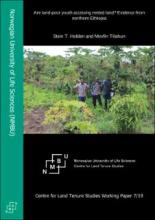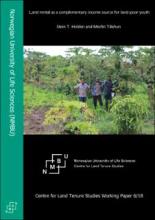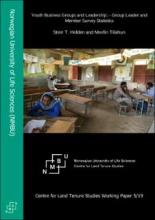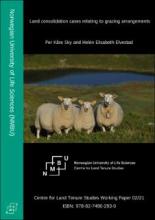/ library resources
Showing items 1 through 9 of 174.Continued strong population growth in already densely populated rural areas in parts of Sub-Saharan Africa makes it harder for youth to choose agriculture as their main source of income. We investigate whether near landless youth still can access rented land as a complementary source of income.
Continued high population growth in already densely populated rural areas in parts of Sub-Saharan Africa makes it harder for youth to choose agriculture as their main source of income. We investigate whether near landless youth can still access rented land as a complementary source of income.
In most countries, land consolidation was first introduced in rural areas, with legislation suitable for urban areas being drafted at a later date. This is also true of Norway. The first evidence of urban competency in the legislation is found in the Land Consolidation Act from 1950.
This working paper is an output from the research project “Youth Business Groups for Sustainable Development: Lessons from the Ethiopian Model” that is funded by Research Council of Norway under the NORGLOBAL2 research program for the period 2019-2022.
Land consolidation courts deal with cases where the relationship between holders of grazing rights needs be regulated, but also where the rights holders are competing with other potential land uses, such as building holiday cabins, forestry, hunting, etc.
Implementing the land reform, territories of farms were quite often formed of several - up to 20 - land plots, frequently with disadvantageous borders.
The sustainable development of rural areas nowadays faces the challenges of global changes. This paper aims to review the concept of land use and landscape multi-functionality in order to help adapting land and landscape use to the new social, economic and ecological demands.
Rural landscape of the southern part of Lithuania as well as its use is analysed in the article. The defects of land reclamation system cause the rise of deserted lands. Dampness and bagged up soils are a large obstacle for the proper use of deserted lands.
This paper addresses the amelioration of the impact of AIDS on land tenure and livelihoods. The author argues that, in Lesotho, land policy development should be informed by the status of community support and welfare for those infected and affected by HIV/AIDS.
Pagination
Land Library Search
Through our robust search engine, you can search for any item of the over 73,000 highly curated resources in the Land Library.
If you would like to find an overview of what is possible, feel free to peruse the Search Guide.






